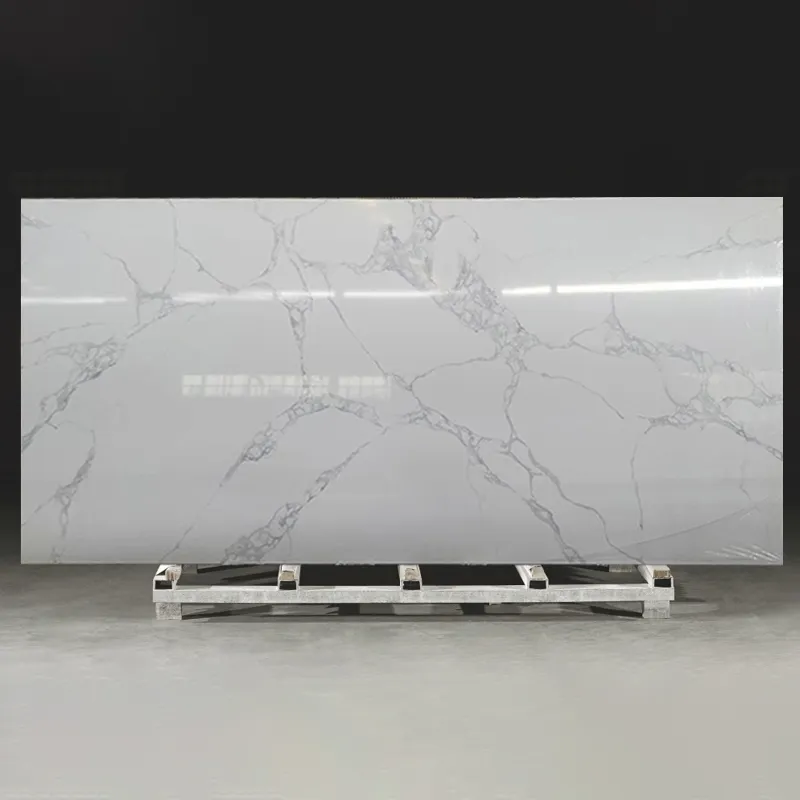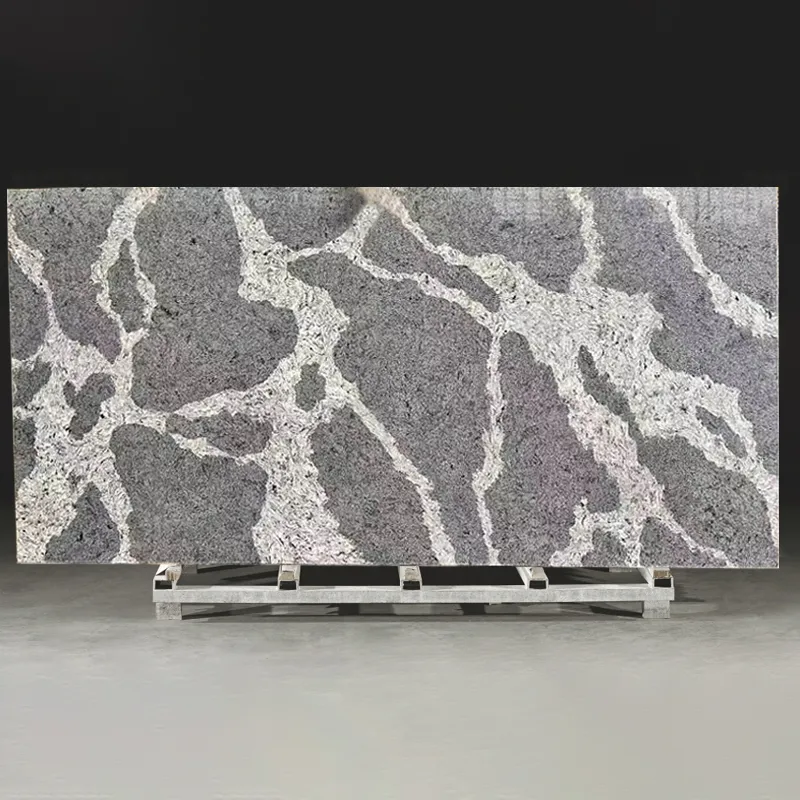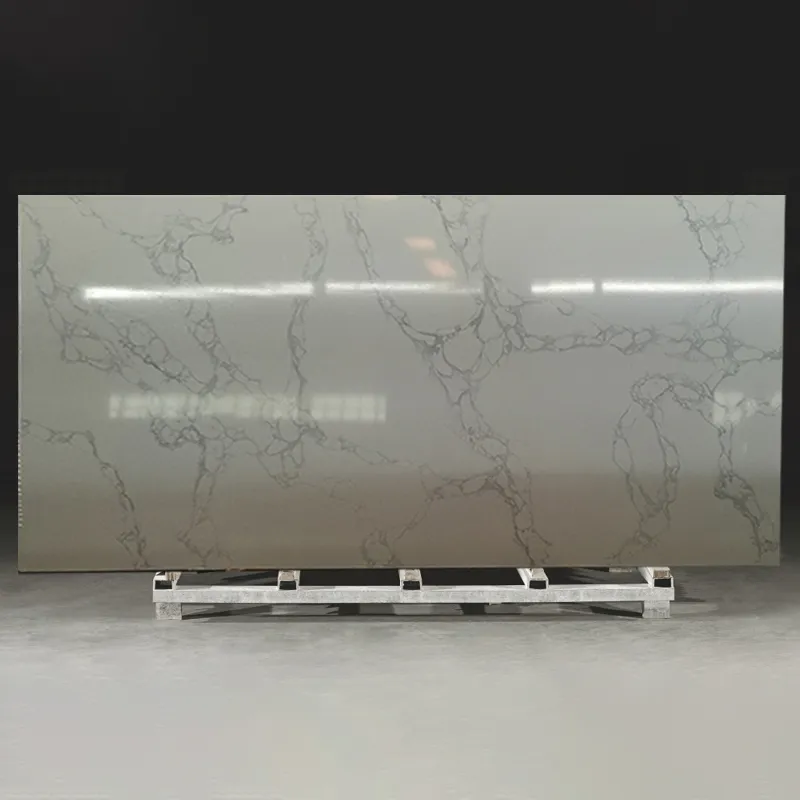Quartz countertops are not only stylish and beautiful, but they are also a popular choice in modern kitchens and bathrooms due to their durability and low maintenance requirements. However, even the most sturdy countertops require proper cleaning and care to keep their long-lasting brilliance. While quartz worktops are easier to maintain than many natural stones, they are not maintenance-free.
Want a quartz worktop that looks like new? Don't worry, this article will take you through the in-depth knowledge of how to clean and care for quartz countertops like a pro. Whether it's daily cleaning or dealing with stubborn stains, we will provide you with a detailed how-to guide from start to finish, and share some practical tips to prevent damage and keep your quartz worktops shining after years of use.

Table of Contents
1. Understanding Quartz Countertops
1.1. Unique Properties of Quartz
1.1.1. Durability
1.1.2. No Porosity
1.1.3. Resistance to Stains and Scratches
2. Basic Tools and Supplies
2.1. Soft Microfiber Cloth
2.2. Mild Dishwashing Soap
2.3. Warm Water
2.4. Non-Abrasive Cleaners
3. Daily Cleaning Procedures
3.1. Rapid Spill Response
3.2. Preparing Your Cleaning Solution
3.3. Wetting the Cloth
3.4. Gentle Cleaning
3.5. Rinse and Dry
4. Treating Stubborn Stains to Clean Quartz Countertops
4.1. Coffee Stains:
4.2. Wine Stains:
4.3. Oil Stains:
5. Precautions to Keep Quartz Countertops Vibrant
5.1. Use a Cutting Board and Trivet
5.2. Prevent Heat Damage
5.3. Use Coasters Under Glasses
6. Avoid Harsh Chemicals
6.1. Erosion of Resin Bonds
6.2. Discoloration and Dulling
6.3. Surface Scratches
7. Sealing and Polishing Quartz Countertops
7.1. Sealing Quartz Countertops
7.2. Polishing Process for Cleaning Quartz Countertops
8. Tips for Maintaining Quartz Countertops
1. Understanding Quartz Countertops
Before discussing how to clean quartz countertops, let’s first understand the uniqueness of quartz material. Quartz is a composite material made of more than 90% natural quartz ore mixed with resins and pigments. It is extremely durable and non-porous, which makes it an ideal countertop material.
1.1. Unique properties of quartz
Quartz has properties that set it apart from other countertop materials. Understanding these properties can help you choose the right cleaning method.
1.1.1. Durability
Quartz has a hardness of 7 on the Mohs hardness scale, just behind diamond, corundum, and topaz. This means it is very durable and can withstand daily use, scratches, and the placement of heavy kitchen utensils. As a result, quartz countertops are not only beautiful, but also very practical.
1.1.2. No Porosity
Unlike natural stones such as marble and granite, quartz worktops do not have microscopic pores. This means that liquids cannot penetrate the interior of the countertop, reducing the risk of staining and bacterial growth. This property makes quartz countertops particularly suitable for humid environments such as kitchens and bathrooms.
1.1.3. Resistance to stains and scratches
The resin composition of quartz worktops makes them naturally stain-resistant, avoiding staining from common liquids such as red wine and coffee. However, this does not mean that quartz countertops are "invincible", and some acidic or highly corrosive chemicals may still damage their surface. Minor scratches are unlikely to leave marks, but using the wrong tools or cleaning agents may scratch the countertop.

2. Basic tools and supplies
Since quartz countertops have their own unique characteristics, we need to use the right tools and cleaning agents when cleaning to effectively clean the countertop without damaging it.
2.1. Soft microfiber cloth
Microfiber cloth is one of the best tools for cleaning quartz countertops. Its soft material will not scratch the surface of the countertop, while effectively absorbing dust and dirt, providing a good cleaning effect.
2.2. Mild dishwashing liquid
Quartz countertops do not require strong detergents. Mild dishwashing liquid is enough to remove everyday stains without damaging the resin layer of the countertop. Avoid using cleaners containing bleach or ammonia, as these chemicals may cause the countertop to discolor or lose its luster.
2.3. Warm water
Warm water is one of the simplest but most effective cleaning solutions. Not only does it help dissolve stains, it also gently cleans the countertop without causing any damage to the surface.
2.4. Non-abrasive cleaners
If you need to deal with stubborn stains, choose non-abrasive cleaners. These cleaners are gentle but effective, removing stains without damaging the surface of the quartz worktop.
3. Daily cleaning routine
Daily cleaning is key to keeping your quartz countertops looking like new. Although quartz countertops don't easily absorb stains, cleaning up spills and keeping the countertops clean can effectively extend the life of the countertop.
3.1. Quick spill response
Promptly cleaning up spills is key for any countertop, especially for quartz worktops. Although it is stain-resistant, liquids that are left untouched for a long time, especially acidic liquids, can still damage the countertop. Mopping up spills immediately after each use of the kitchen can effectively reduce the formation of stains.
3.2. Prepare your cleaning solution
For daily cleaning, prepare a mixture of warm water and a small amount of mild dishwashing liquid. This simple cleaning solution is enough to remove everyday dirt and oil stains without causing any damage to the countertop.
3.3. Wet the cloth
Use a soft microfiber cloth and lightly wet it. Then pat off any excess water, making sure the cloth remains damp but not dripping. This will effectively clean the countertop without leaving any water stains.
3.4. Gentle cleaning
Use a damp microfiber cloth to gently wipe the countertop surface. Please note that quartz countertops do not require vigorous wiping, and gentle cleaning is sufficient. When wiping, follow the direction of the grain of the countertop to help remove more stubborn stains.
3.5. Rinse and dry
Once you have finished wiping, rinse the cloth with clean water and wipe the countertop again to ensure that no detergent remains. Finally, use a clean, dry cloth to wipe the countertop dry to avoid the formation of water stains or spots.

4. Dealing with Stubborn Stains to Clean Quartz Countertops
Although quartz worktops are highly stain-resistant, some stubborn stains may still appear, especially in frequently used areas such as kitchens and bathrooms. For these stains, we have some special methods to deal with them.
4.1. Coffee Stains
Coffee is a common source of stains in everyday life. Although quartz countertops are not easily stained, long-term exposure to coffee may cause the countertop to discolor. When dealing with coffee stains, you can wipe with a solution of warm water and mild dishwashing liquid. For stubborn coffee stains, you can try using a non-abrasive detergent.
4.2. Wine Stains
Red wine is another liquid that can cause countertop discoloration. Similar to coffee, timely cleaning is key to avoid staining. If wine stains have already appeared, you can gently wipe with warm water and non-abrasive detergent. If the wine stain is particularly stubborn, it is recommended to use a cleaning product specifically for quartz countertops.
4.3. Oil Stains
It is inevitable that oil stains will appear on kitchen countertops. When dealing with oil stains, a mild dishwashing liquid is the best choice. It effectively dissolves grease without damaging the surface of the countertop. If the grease is stubborn, spray a mixture of warm water and dishwashing liquid on the grease, let it sit for a few minutes, and then wipe it with a cloth.
5. Precautions to keep your quartz countertop vibrant
In addition to daily cleaning, taking some precautions can effectively protect your quartz countertop, extend its life, and maintain its brilliance.
5.1. Use a cutting board and a tripod
Although quartz countertops are very durable, it is important to use a cutting board and a tripod to prevent accidental scratches or heat damage. Avoid cutting ingredients or placing hot pans directly on the countertop to avoid damaging the countertop surface.
5.2. Prevent heat damage
Although quartz worktops are heat-resistant, the resin component is sensitive to extreme heat. Prolonged contact with hot objects may cause heat marks on the countertop surface. It is recommended to always use a tripod or heat insulation pad to avoid placing hot pans or baking trays directly on the countertop.
5.3. Use coasters under glasses
While quartz countertops are stain-resistant, long-term water stains or condensation may leave water marks on the surface. Especially in humid environments, using coasters is a good way to avoid water stains. Make sure to use coasters when placing drinks, especially on hot days or when serving cold drinks.

6. Avoid using harsh chemicals
Quartz worktops are sensitive to some chemicals. Avoid using acidic cleaners or abrasive cleaning products, which may cause permanent damage to the surface of quartz countertops.
6.1. Erosion of resin bonds
The resin component in quartz worktops is sensitive to acidic substances such as vinegar or citric acid. Cleaning with these chemicals may cause the resin to corrode, thereby destroying the smooth surface of the countertop.
6.2. Discoloration and dullness
Using cleaners containing bleach or strong acids may cause the countertop to discolor or lose its gloss. To avoid this, always choose a mild cleaner and try to avoid using any strong chemicals.
6.3. Surface scratches
Abrasive cleaners, steel wool and other rough tools may leave fine scratches on quartz countertops. Even durable quartz countertops are not suitable for cleaning with these tools, especially if you want to keep the countertop smooth and shiny.
7. Sealing and polishing quartz countertops
Although quartz countertops do not need to be sealed as regularly as natural stone, in some cases, proper sealing and polishing can still increase the durability and beauty of the countertop.
7.1. Sealing quartz countertops
Typically, quartz countertops do not need to be sealed as regularly as granite or marble due to their non-porous nature. However, some manufacturers recommend that in special cases, such as when the countertop is exposed to oils or acids for a long time, you can consider using a special quartz sealer to provide additional protection.
When sealing quartz worktops, the sealant used must be designed for quartz. Such products will not block the tiny pores in the quartz surface and will not cause the countertop to lose its gloss or discolor. When applying the sealant, remember to follow the manufacturer's instructions and avoid over-application to prevent residue that is difficult to clean.
7.2. Polishing process for cleaning quartz countertops
The glossy feel of quartz countertops is often one of the reasons why people choose it. In order to maintain this gloss, occasional polishing is necessary. Although quartz countertops are naturally shiny, after a period of use, especially in high-use kitchen areas, the surface of the countertop may appear dull.
Polishing quartz countertops does not require expensive tools or complicated processes. You can use a polish designed specifically for quartz countertops. Such products usually contain fine polishing particles that can gently remove small scratches on the surface and restore the natural gloss of the countertop. When polishing, make sure to use a soft microfiber cloth to avoid scratching the countertop.

8. Maintenance tips for quartz countertops
In addition to daily cleaning and dealing with stubborn stains, long-term maintenance is also an important step to maintain the gloss of quartz worktops. Here are some key maintenance tips to ensure your quartz worktops look like new after years of use:
● Avoid direct cuts on the countertop: Although quartz worktops are durable, direct cuts on the countertop may leave small scratches. Using a cutting board is an easy way to avoid this damage.
● Avoid exposure to high temperatures: Although quartz worktops can withstand a certain amount of heat, placing hot pans directly on the countertop may cause damage to the resin. Using a potholder or trivet to protect the countertop is the best practice to prevent this damage.
● Clean up any spills immediately: Quartz worktops are not easily penetrated by liquids, but long-term stains may still cause slight discoloration. Keeping the countertop dry and clean can effectively prevent these problems.
● Use a specialized cleaner regularly: To enhance the shine of the countertop, you can regularly use a cleaner or polish specifically for quartz. This will help the countertop maintain its shine and avoid damage caused by using the wrong cleaner.
● Protect from direct sunlight: Although quartz countertops are suitable for installation in most indoor spaces, long-term exposure to direct sunlight may cause the color of the countertop surface to change. Therefore, if your kitchen or bathroom has large windows, try to use curtains or sunshades during the day to avoid excessive UV exposure.
Once you learn how to properly clean and maintain quartz worktops, you will find that it is not difficult to keep the countertops as bright and clean as new. The advantage of quartz countertops lies not only in its beauty, but also in its extremely high durability and easy maintenance.
With these cleaning tips in mind, you will be able to easily handle the cleaning and maintenance of quartz worktops like a professional, and easily keep your home environment clean and beautiful. After all, who doesn't want to have a quartz worktop that is as bright as new and makes the whole home look more textured?
As long as you follow this guide for daily maintenance, your countertops will continue to add luster to your home and become the most dazzling part of your home!

